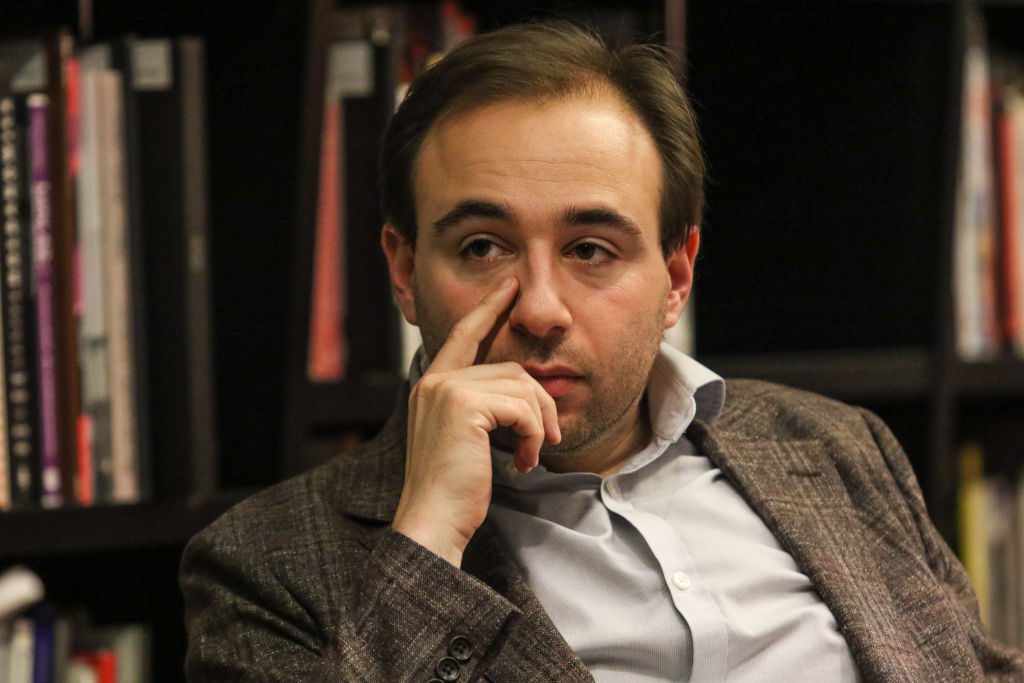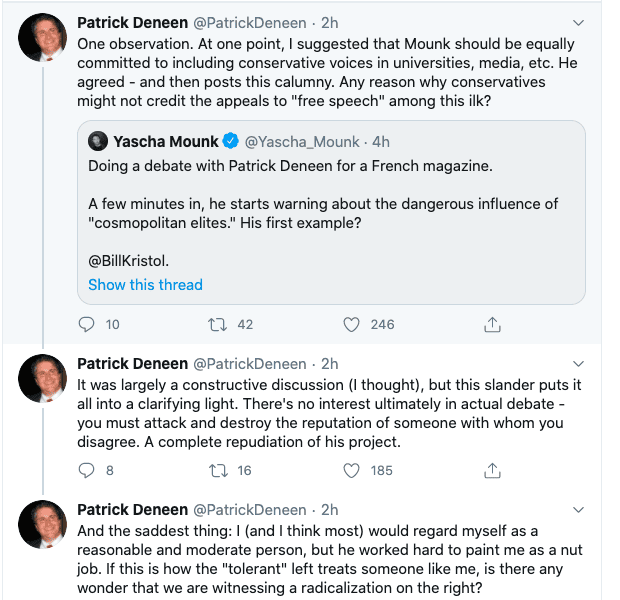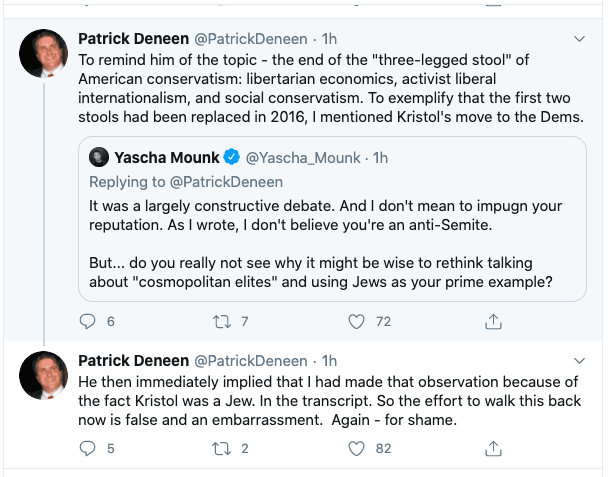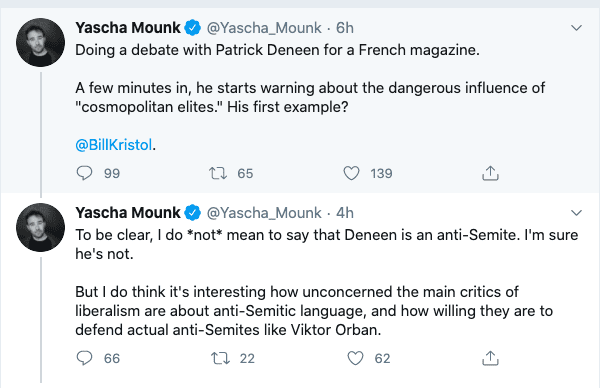The ‘No Friends To The Right’ Principle

I’m reading Martin Malia’s great history of socialism in the Soviet Union, and learned from it that the “no enemies to the Left” principle we commonly observe among liberals actually goes back to the 19th century. Something happened today to my friend Patrick Deneen that is awful, but worth talking about because it is exemplary of a tactic the left uses all the time, something that poisons debate. It might be thought of as an example of the “no friends to the right” principle.
The other day I posted the following excerpt from a 2018 debate about political correctness. Watch the exchange (I’ve cued it to that point) between Jordan Peterson and Michael Eric Dyson. Peterson asks Dyson, who is on the left, at what point would someone on the left have gone too far — that is, what is the line between acceptable left-wing thought and behavior, and unacceptable. All Dyson does is puff and blow and accuse Peterson of exercising white privilege just because he asked the question:
What happened with Deneen today is not that bad, but it’s a variation of it. I’m writing about it not only because Deneen is my friend, and he has been unfairly maligned, but also because this kind of thing is going to happen to a lot of right-of-center people in the days, months, and years to come. It must be called out and challenged wherever we see it.
I’m going to allow Deneen and his interlocutor Yascha Mounk — both politics professors — explain what happened:
Doing a debate with Patrick Deneen for a French magazine.
A few minutes in, he starts warning about the dangerous influence of “cosmopolitan elites.” His first example? @BillKristol.
— Yascha Mounk (@Yascha_Mounk) September 2, 2020
To be clear, I do *not* mean to say that Deneen is an anti-Semite. I’m sure he’s not.
But I do think it’s interesting how unconcerned the main critics of liberalism are about anti-Semitic language, and how willing they are to defend actual anti-Semites like Viktor Orban.
— Yascha Mounk (@Yascha_Mounk) September 2, 2020
More:

And:

Fortunately, Patrick has a lot of people who know him, respect him, and who know that accusing him, even remotely, of anti-Semitism is a smear. Some of these defenders are Jews:
Yascha, if you’re going to use every tweet to smear and delegitimize conservatives, why not just say openly that you aren’t willing to participate in a two-party democratic system.
You go ahead and guess who will be left in charge once all the conservatives are gone. https://t.co/DYZu2CqSeV
— Yoram Hazony (@yhazony) September 2, 2020
Absurd “Trope Antisemitism”—hypersensitivity to microagressions that enable innocent people to be calumnied based on their politics—comes at the cost of minimizing actual threats to Jews and their lives. Jews are safe in Orban’s Hungary, but @PatrickDeneen is bad bc “trope.” https://t.co/NpbjGnc71Z
— David Reaboi (@davereaboi) September 2, 2020
Some prominent conservatives are rightly offended — and shocked because Yascha Mounk has a reputation as a thoughtful liberal:
This is really very very poor Yascha, it’s a quite deliberate smear against @PatrickDeneen I thought you were against this type of behaviour – why do it? Your acting exactly like those who you purport to oppose – very depressing https://t.co/YfPvDDuPZr
— Phillip Blond (@Phillip_Blond) September 2, 2020
Unless we have a serious reason to regard our interlocutors as actual bigots, we should refrain from making those accusations, which, in this environment, can be career-killers. I believe that there are real anti-Christian bigots in the world. I do not believe that most people who criticize Christians for this or that reason are motivated by bigotry, and do my best not to assume that they are unless I’m given a good reason to think so. Granted, accusing someone of anti-Christian bigotry will not hurt their career in our culture, but still, it’s important to give people the benefit of the doubt — especially if we are going to have a culture of open discussion and debate.
The fact is, Bill Kristol is a cosmopolitan elite. And so are all the Gentiles who are part of his class. Patrick Deneen, as a Georgetown professor, was too — in fact, moving to Notre Dame and being an outspoken conservative and believing Catholic is in some sense his being a traitor to his class. Me, I left the East Coast for the Bozart too, and though I don’t live in a cosmopolis, the cosmopolis sure does live in me — for better and for worse. My closest friends are all cosmopolitan elites of the left and the right. I don’t think it’s necessarily a slur, though Stalin certainly made it one (the Soviets infamously derided Jews as “rootless cosmopolitans”).
It must be possible for political scientists (especially theorists like Mounk and Deneen), journalists, and others to discuss the easily observable phenomenon of a global class of people — by no means limited to Jews — whose interests, convictions, and priorities are generally opposed to those of populists. The anti-Brexit people in Britain — Jew and Gentile, black and white — were mostly cosmopolitans. Some pro-Brexit intellectuals — Philip Blond, Tim Montgomerie, Boris Johnson — are also cosmopolitans, though their loyalties run more towards nationalism than to internationalism. One thing that makes figures like Deneen such good analysts of the globalist cosmopolitan mentality is because they themselves are, or have been, embedded in it, and are well aware of the privileges that its avatars exercise — privileges of which they are scarcely aware.
The fact that there are anti-Semites (alas) in this world should not make it impossible to discuss these political and sociological facts, though obviously we should do it with great care. What is galling about this Mounk smear is that he knows, or ought to know, that a professor of Deneen’s distinction is extremely unlikely to be an anti-Semite, and if he were, he would have the professional good sense to keep quiet about it.
Now, though, because a distinguished academic like Mounk leveled the charge, Deneen will have to deal with it. “Patrick Deneen — aren’t you that anti-Semitic guy?” If Deneen had even the slightest idea that Mounk would have hit him with that, I’m sure he never would have agreed to the debate. I wouldn’t have.
This is why there is a rising feeling among right-of-center intellectuals to avoid debating and discussions with the left. There is a dramatic falling off of trust on our side. We have seen it happen too many times. Just this week, Ben Smith of the Times published a profile of Andrew Sullivan that brought up Sullivan’s key role in publishing essays on The Bell Curve — as if that editorial decision 25 years ago (a defensible one, I should say!) is the shadow that darkens Sullivan’s reputation. Had Sullivan known that Smith came in with that stiletto in his backpack, he never would have opened the door, I bet.
Should we talk to journalists? Should we talk to liberal and progressive academics? Or will doing so simply open us up to being smeared as bigots?
Yascha Mounk, a political scientist at Johns Hopkins, is the founder of Persuasion, a web-based community based on defending liberal ideals of free expression. He explained it like this. Excerpt:
To safeguard the great cultural and political progress of the past half century, those of us who believe in the values of a free society need to rise to the fight of a lifetime.
At the very moment when it would be most important for those who oppose an emboldened far-right to speak with confidence and conviction, these same values are losing their luster among significant parts of the left. Companies and cultural institutions fire innocent people for imaginary offenses; prominent voices alternate between defending cancel culture and denying its existence; and an astonishing number of academics and journalists proudly proclaim that it is time to abandon values like due process and free speech.
It would be easy, and not altogether wrong, to point the finger of blame for the erosion of democracy at its sworn enemies. But the truth is that part of the reason why these values are vulnerable is that so many of their defenders have themselves fallen short.
Too often, those of us who are committed to a free society lack convincing answers to pressing political questions, including the persistent disparities of race and class. Too often, those of us who seek to defend democracy against its enemies are deeply enmeshed in an establishment that gives people good reason to rebel against it. And too often, those of us who seek to mount a case for philosophically liberal values do so in an overly apologetic or unimaginative way.
And so Mounk, because his conservative academic interlocutor, used the word “cosmopolitan” to describe a prominent neoconservative Jewish intellectual, denounces that conservative interlocutor to his 103,000 Twitter followers in these two posts (which I’ll repeat here, because they’re so damned disingenuous):

“I don’t think Deneen is an anti-Semite, but he sure does sound like one.” Good grief.
There is almost nothing controversial that any of us conservatives could talk about today that wouldn’t open us up to the same chickensh*t criticism. I don’t think ___ hates black people, but by criticizing Black Lives Matter, she sure sounds like a racist. … I don’t think ___ hates gays, but when he defends ‘religious liberty,’ it sounds like dog whistling for homophobia. Et cetera.
I despise anti-Semitism, and police my blog’s comments to keep it out. It’s a tough call, because I don’t believe that mere criticism of Israel (I country I support) is anti-Semitic. I also don’t believe that criticizing Jewish political figures is necessarily anti-Semitic. In Hungary, for example, the fact that George Soros is Jewish should not immunize him from criticism about the way he, as an extremely rich globalist, tries to influence the country’s political culture. There are commenters here who walk right up to the line, and I usually spike their comments. Same with any kind of bigotry, though I do try to err on the side of allowing a greater range of expression.
Still, when you live in a culture — especially a professional culture, like academia — where the mere accusation of bigotry can cause tremendous harm, what reason do you have, as a conservative, to expose yourself to it by conversation with a liberal? I only do interviews with the mainstream media in writing now — and I have privately decided just not to talk to reporters with certain publications, because I don’t believe I can get a fair shake from them. This is going to be more common, and it’s going to be bad for us all, but people like Yascha Mounk are making it happen by not discerning between the enemies of decency, and people who simply disagree with them from the Right.
Subscribe for as little as $5/mo to start commenting on Rod’s blog.